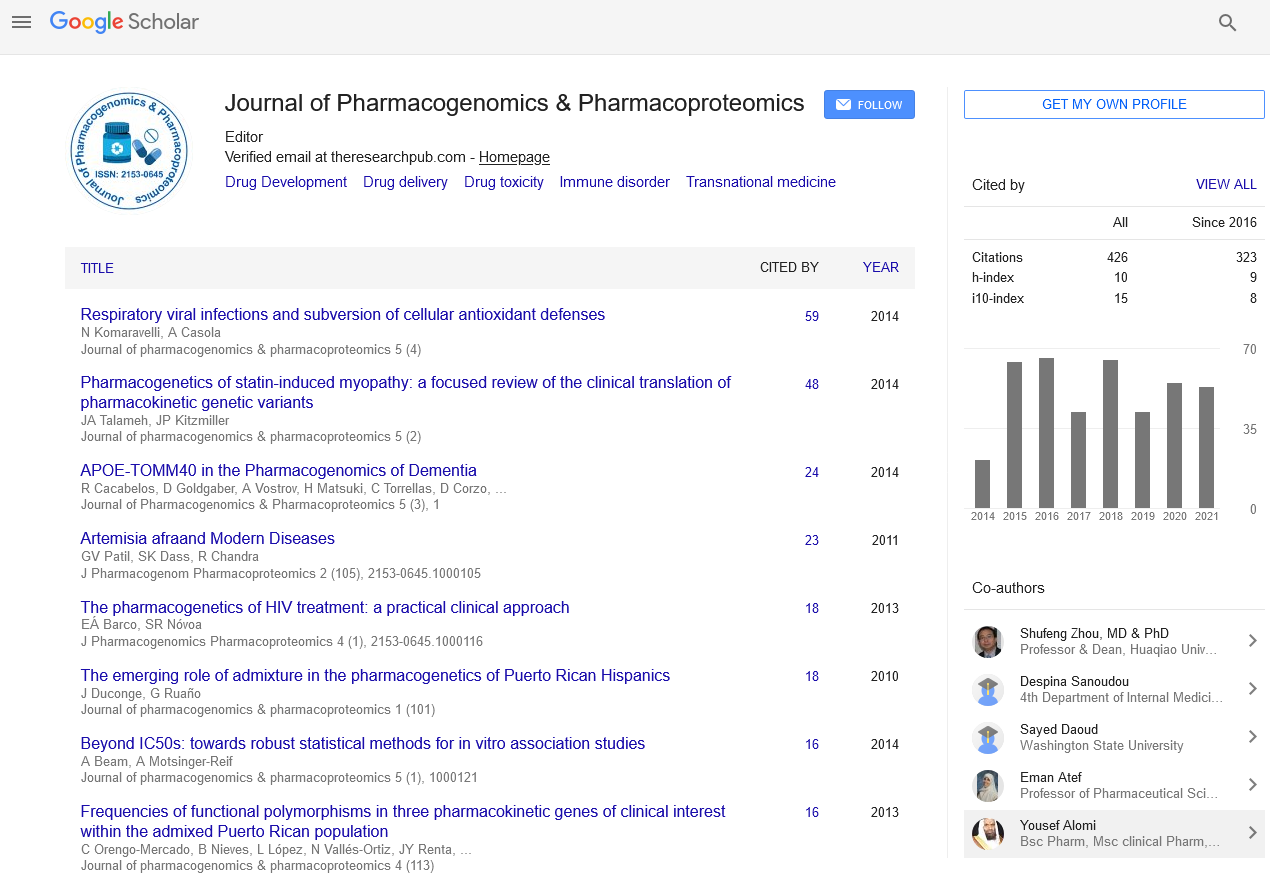Indexed In
- Open J Gate
- Genamics JournalSeek
- Academic Keys
- JournalTOCs
- ResearchBible
- Electronic Journals Library
- RefSeek
- Hamdard University
- EBSCO A-Z
- OCLC- WorldCat
- Proquest Summons
- SWB online catalog
- Virtual Library of Biology (vifabio)
- Publons
- MIAR
- Euro Pub
- Google Scholar
Useful Links
Share This Page
Journal Flyer

Open Access Journals
- Agri and Aquaculture
- Biochemistry
- Bioinformatics & Systems Biology
- Business & Management
- Chemistry
- Clinical Sciences
- Engineering
- Food & Nutrition
- General Science
- Genetics & Molecular Biology
- Immunology & Microbiology
- Medical Sciences
- Neuroscience & Psychology
- Nursing & Health Care
- Pharmaceutical Sciences
Antibody-proteases as translational tools of the latest generation to minimize risks of chronification of autoimmune disorders and disabling rates of the patients
4th International conference on Predictive, Preventive and Personalized Medicine & Molecular Diagnostics
September 22-23, 2016 Phoenix, USA
Sergey Suchkov
I.M. Sechenov First Moscow State Medical University, Russia
Keynote: J Pharmacogenomics Pharmacoproteomics
Abstract:
The methodological bricks of subclinical diagnostic protocols should include basic algorithms to differ essentially from those employed in traditional clinical practice, i.e., to confirm a diagnosis of subclinical stage of the disease course and to select a mode for preventive treatment to quench the autoimmune inflammation. In this sense, among the best validated proteome-related biomarkers, antibodies (Abs) are the best known ones to represent one of the principal immune effectors and thus key mediators of inflammatory responses to generate the events. Most of autoimmune disorders including multiple sclerosis (MS), autoimmune myocarditis (AIM) and autoimmune thyroiditis (AIT) are preceded by a symptom-free subclinical stage in which the disorder can be identified by specific autoAbs. Proteolytic Abs are multivalent immunoglobulins (Igs) endowed with a capacity to proteolyze the antigenic substrate. Abs against myelin basic protein/MBP, cardiac myosin (CM) and thyroid globulin (TG) endowing with targeted proteolytic activity (Ab-proteases) are of great value to monitor a stepwise autoagression (e.g., demyelination in MS or chronic myocarditis in AIM) at either of the stages (subclinical and clinical ones) to illustrate the evolution of the disorder. Those Abproteases at either of the disorders mentioned are capable of demonstrating Ab-associated targeted proteolytic activity to attack and thus destroy the targeted Ags whilst correlating with the severity and course of the disease. The activity of the targeted Ab-proteases markedly differs between: The patients and healthy controls; different clinical courses; scales of disabling to correlate with the disability of the patients to predict transformation prior to changes of the clinical course. The latter means that when we saw a stable growth of the activity, we could predict transformations in the clinical course prior to changing in a pattern of the clinical manifestations. The traditional applications of assays for canonical autoAbs for diagnostic and prognostic purposes in patients with autoimmune disorders and/or persons at risk have yielded conflicting results. Meanwhile, the activity of Ab-proteases has proved to confirm a high subclinical and predictive value of the tools exploited as applicable for personalized monitoring protocols. It is so important to stress that the close association between the proteolytic sensitivity of the targeted auto Ags and post-translational modifications of the latter may represent one of the key regulatory mechanisms in the epitope generation. For sure, a combinative (enzyme and Abmediated) proteolysis may illustrate a crucial pathway to exert a concerted attack on the autoAgs, although mechanisms responsible for the activation of these potential activities are not known yet. Ab-proteases can be programmed and re-programmed to suit the needs of the body metabolism or could be designed for the development of principally new catalysts with no natural counterparts. Of tremendous value are Ab-proteases directly affecting the physiologic remodeling of tissues with multilevel architectonics (for instance, myelin or cardiac muscle) and autoAb-mediated proteolysis could thus be applied to isolate from Ig molecules; the efficient catalytic domains directed against particular autoimmune epitopes pathogenically and clinically relevant. Further studies may provide a supplementary tool for predicting auto-aggression and thus the disability of the persons at risk prior they would become patients.
Biography :
Sergey Suchkov is a Researcher-Immunologist and a Clinician graduated from Astrakhan State Medical University, Russia in 1980. He has been trained at the Institute for Medical Enzymology, The USSR Academy of Medical Sciences, National Center for Immunology, Rus-sia, NIH, Bethesda, USA and British Society for Immunology to cover 4 British university facilities. Since 2005, he has been working as a Faculty Professor of I.M. Sechenov First Moscow State Medical University and of A.I. Evdokimov Moscow State Medical & Dental University. He is the First Vice-President and Dean of the School of PPPM Politics and Management of the University of World Politics and Law. He was a Scientific Secretary-in-Chief of the Editorial Board of the International Journal “Biomedical Science” (Russian Academy of Sciences and Royal Society of Chemistry, UK) and The International Publishing Bureau at the Presidium of the Russian Academy of Sciences. He was the Director of the Russian-American Program in Immunology of the Eye Diseases. He is a Member of EPMA, NY Academy of Sciences and an Editorial Board Member for Open Journal of Immunology and others.
Email: ssuchkov57@gmail.com


